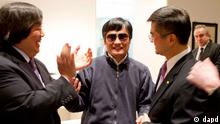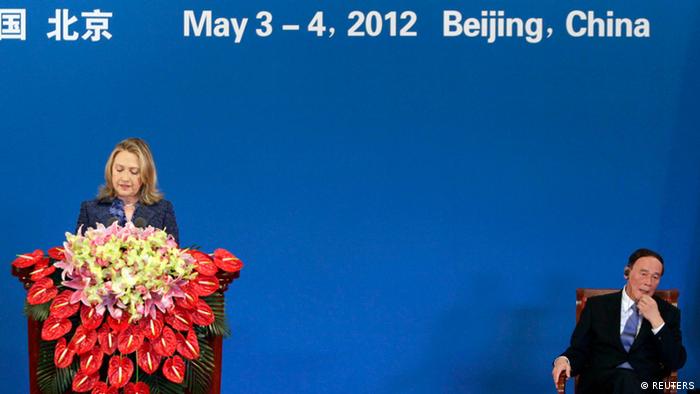Senior officials from the US and China opened two days of strategic and economic talks on Thursday. But nobody wanted to mention what must have really been on their minds - the fate of Chinese dissident Chen Guangcheng.
Secretary of State Hillary Clinton, who, along with Treasury Secretary Timothy Geithner, is representing the US at the conference, raised the issue of human rights in her opening speech but did not refer to dissident Chen Guangcheng by name.
The US believes that "all governments have to answer our citizens' aspirations for dignity and the rule of law and that no nation can or should deny those rights," Clinton said.
Chinese President Hu Jintao's tone was considerably more conciliatory than that of a Foreign Ministry spokesman who on Wednesday had demanded an apology from the US for allowing Chen to shelter at the country's embassy in Beijing. President Hu said that given the two countries' different perspectives, it was impossible for them to agree on all issues.
"We should properly manage the differences by improving mutual understanding so the differences will not undermine the larger interests of China-US relations," he said.
A wish to leave China for the US
Meanwhile, Chen, 40, who escaped from house arrest two weeks ago before finding refuge in the US embassy, now says he wants to go to the United States rather than stay in China and that he only left the embassy due to threats made against his family. He was earlier reported to have expressed a wish to remain in China.
When he left the embassy on Wednesday he was taken to a hospital for treatment of injuries he sustained during his escape from house arrest. There he was reunited with his family.

Chen Guangcheng was al smiles shortly after leaving the embassy
Just hours later though, the blind self-taught lawyer said in telephone interviews with a number of news organizations that embassy staff had passed on threats from Chinese authorities that his wife would have been beaten to death if he didn't leave the US compound. US officials, though, give a completely different account of events.
"I can tell you unequivocally that he was never pressured to leave. He was excited and eager about leaving," US Ambassador Gary Locke told reporters in Beijing on Thursday.
Chen's wish to leave China has cast doubt on an agreement between US and Chinese officials that he vacate the American embassy on Wednesday in return for assurances that he would be kept safe and allowed to study at the university of his choice.
US officials said they had also received assurances that they would be able to visit Chen in hospital to check on his condition. It wasn't clear if they would be able to monitor his safety in China in the long term.
pfd/ncy (Reuters, AFP, dpa)

No comments:
Post a Comment